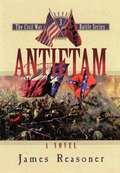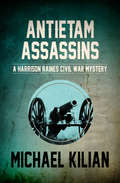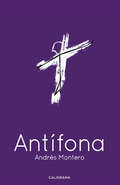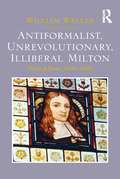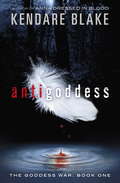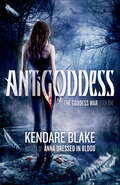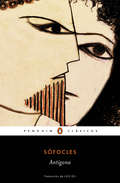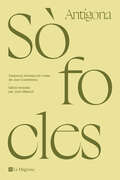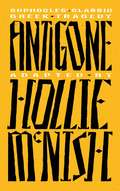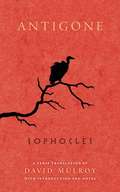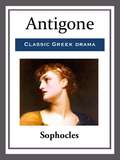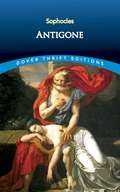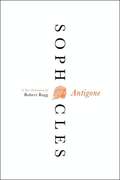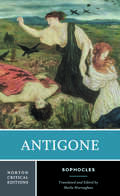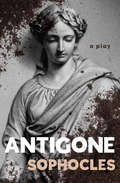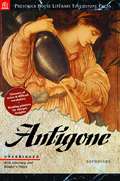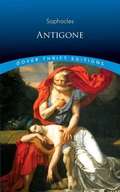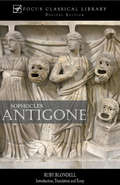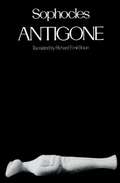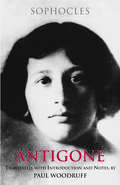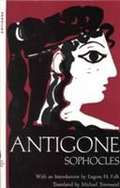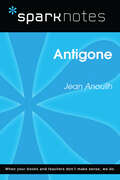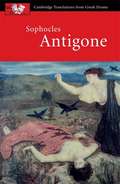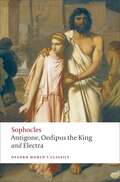- Table View
- List View
Antietam (The Civil War Battle Series, Book #3)
by James Reasoner[From the back cover] Will glanced at the cornfield to his right and saw the hail of bullets cutting through the growth, knocking ears of corn from their stalks and making the plants sway as if a wind were blowing over them. It was a wind of death, thought Will, and that was all he had time to think before the Federals were upon them. He emptied his pistol at almost point-blank range as the leading edge of the Union attack reached the trees. Around him, the men of his company could hold back no longer. With Rebel yells sounding from their throats, they leaped forward, firing their rifles, thrusting with bayonets, slashing with rifle butts. The two sides came together with an audible crash. Grunts of exertion mingled with shrieks of pain. Men who tripped and fell were trampled ruthlessly underfoot by friend and foe alike. Will pulled his saber from its scabbard. His training in its use had been rudimentary at best, but he knew how to hack back and forth with the blade. As he fought, his senses alternated between a heightened awareness and a dull numbness. There were moments that were crystal clear, etched in his memory for the rest of his life: the open, shouting mouth of a Union soldier lunging at him, the bitter stench of powder smoke in his nose, the burning pain of a bullet that grazed his left shoulder and tore his uniform but left only a red mark on his flesh. At other times he seemed surrounded by a fog that pressed in on him so that the figures around him were blurry and the sounds of battle only a distant din. But always he fought, striking out at anyone in a blue uniform. Something brushed his face, and he realized it was a corn tassel. He had stumbled into the field without knowing it. All around him the plants were falling, some of the stalks cut down by flying bullets, others toppled by the bodies of men as they fell, the wounded, the dead, and the dying. Green was splashed with crimson and then crushed into the earth.
Antietam Assassins (The Harrison Raines Civil War Mysteries #6)
by Michael KilianA Civil War spy is pulled out of retirement to find a killer It's 1862, and for Harrison Raines, the Civil War is finished. Since the First Battle of Bull Run, he has served the Union Army as a spy, crisscrossing the war-torn country and witnessing more death, misery, and carnage than any man should. Although a Virginian, he loathes slavery, and is proud to have served Abraham Lincoln. But Raines has had enough killing, and wishes only to retire to a tranquil patch of land. He acquires a plot in the hills of western Virginia and settles down to the life of the gentleman farmer--but Raines's days will not remain quiet for long. When a local parson known to have Union sympathies is killed, Raines fears his new neighbors may come after him next. To secure a peaceful retirement, he will have to stare down death 1 last time. The Antietam Assassins is the 6th book in the Harrison Raines Civil War Mysteries, but you may enjoy reading the series in any order.
Antífona
by Andrés MonteroPoesía mística con Rock 'n' Roll. Antífona es un poema místico sobre Dios encarnado en el ser humano de Jesús de Nazaret para convertirse en el Cristo del tiempo y de más allá del tiempo. Las estrofas son tan irregulares como la existencia, tan abstractas como el misterio, casi siempre tan ásperas como el desencuentro. La fraseología de los versos intenta simular la sensación de estar caminando por el pedregal del desierto, de climatología extrema, prometiendo la belleza desnuda a quien no busque refugio en las convenciones. Existencialmente, Antífona es una población de poemas que no terminan de encajar entre sí del todo, como países con fronteras sísmicas; un territorio lírico donde cohabitan Jesús, María, la Magdalena y el resto de apóstoles, con Juan el Bautista; todos en medio de un mundo salpicado muy a menudo por la fragilidad inherente a los seres perdidos, iluminado en ocasiones por la grandeza que sutilmente enraíza en lo pequeño, e imperecederamente abierto a la esperanza de redención.
Antiformalist, Unrevolutionary, Illiberal Milton: Political Prose, 1644-1660
by William WalkerOn the basis of a close reading of Milton's major published political prose works from 1644 through to the Restoration, William Walker presents the anti-formalist, unrevolutionary, illiberal Milton. Walker shows that Milton placed his faith not so much in particular forms of government as in statesmen he deemed to be virtuous. He reveals Milton's profound aversion to socio-political revolution and his deep commitments to what he took to be orthodox religion. He emphasises that Milton consistently presents himself as a champion not of heterodox religion, but of 'reformation'. He observes how Milton's belief that all men are not equal grounds his support for regimes that had little popular support and that did not provide the same civil liberties to all. And he observes how Milton's powerful commitment to a single religion explains his endorsement of various English regimes that persecuted on grounds of religion. This reading of Milton's political prose thus challenges the current consensus that Milton is an early modern exponent of republicanism, revolution, radicalism, and liberalism. It also provides a fresh account of how the great poet and prose polemicist is related to modern republics that think they have separated church and state.
Antigoddess: Book 1 (The Goddess War)
by Kendare BlakeHe was Apollo, the sun, and he'd burn down anything that tried to hurt her... Cassandra and Aidan are just your average high-school couple. Or so Cassandra believes. Blissfully unaware that she was once a powerful prophetess, Cassandra doesn't even know that god exist...Until now.Because the gods are dying - and Cassandra could hold the answer to their survival. But Aidan has a secret of his own. He is really Apollo, god of the sun, and he will do anything to protect the girl he loves from the danger that's coming for her. Even if it means war against his immortal family...Sexy, irresistible characters; romantic and mythological intrigue; relentless action and suspense - ANTIGODDESS is the YA novel you've been waiting for.
Antigoddess: (antigoddess, Mortal Gods, Ungodly) (The Goddess War #1)
by Kendare BlakeThe Goddess War begins in Antigoddess, the first installment of the new series by acclaimed author of Anna Dressed in Blood, Kendare Blake.Old Gods never die…Or so Athena thought. But then the feathers started sprouting beneath her skin, invading her lungs like a strange cancer, and Hermes showed up with a fever eating away his flesh. So much for living a quiet eternity in perpetual health.Desperately seeking the cause of their slow, miserable deaths, Athena and Hermes travel the world, gathering allies and discovering enemies both new and old. Their search leads them to Cassandra—an ordinary girl who was once an extraordinary prophetess, protected and loved by a god. These days, Cassandra doesn't involve herself in the business of gods—in fact, she doesn't even know they exist. But she could be the key in a war that is only just beginning. Because Hera, the queen of the gods, has aligned herself with other of the ancient Olympians, who are killing off rivals in an attempt to prolong their own lives. But these anti-gods have become corrupted in their desperation to survive, horrific caricatures of their former glory. Athena will need every advantage she can get, because immortals don't just flicker out. Every one of them dies in their own way. Some choke on feathers. Others become monsters. All of them rage against their last breath.The Goddess War is about to begin.At the Publisher's request, this title is being sold without Digital Rights Management Software (DRM) applied.
Antígona
by SófoclesLos mejores libros jamás escritos Antígona, hija del rey Edipo, se debate entre ceñirse a la ley impuesta o infringirla para honrar a su difunto hermano Antígona está basada en el mito de la mujer que se atrevió a enfrentarse a los hombres para lograr sus propósitos. En esencia, la trama de la obra plantea una reflexión sobre la tiranía, las razones del estado y los dilemas de conciencia. Representada por primera vez en el año 442 a.C., Sófocles utilizó personajes arquetípicos para contraponer dos nociones opuestas del deber: el respeto a las normas religiosas frente a las civiles, caracterizadas unas por Antígona y las otras por Creonte. Esta edición cuenta con la traducción y el prólogo Luis Gil, profesor emérito en la Universidad Complutense de Madrid. Incluye, además, el estudio en forma de epílogo realizado por los profesores de comunicación audiovisual de la Universidad Pompeu Fabra Jordi Balló y Xavier Pérez. «Y ¿qué derecho divino he transgredido? Mas ¿por qué he de poner, desdichada de mí, mi vista aún en los dioses? ¿A qué aliado puedo invocar?»
Antígona
by SófoclesAntígona, de Sòfocles, és segurament l’expressió literària antiga més sublim del conflicte humà entre els dictats de la consciència pròpia i les lleis establertes pels homes. Creont, rei de Tebes, ha prohibit sepultar el cadàver de Polinices, que s’ha alçat en armes contra ell. Antígona, però, la germana de Polinices, el desobeeix. I el seu acte i les conseqüències terribles que comporta també són l’expressió del sacrifici personal a causa d’un convenciment que, en aquest cas, té la raó de ser en la pietat entre germans. Ressenya:«La lluita per una justícia que està per damunt d'unes lleis concretes, la lluita pels drets no escrits, no legislats, però inherents en la persona humana..., aquest és el tema de l’Antígona. I per això és una de les tragèdies gregues més valorades.»De la introducció de Joan Castellanos i Vila
Antigone: A New Adaptation of the Classic Greek Tragedy
by Hollie McNishA modern retelling of Sophocles' classic play, Antigone, by bestselling writer and poet Hollie McNishAs the daughter of Oedipus, Antigone was dealt a cruel hand at birth - even within the bounds of Grecian tragedy. When her brothers are slain fighting for the throne of Thebes, Antigone finds herself pitted against her uncle, the newly crowned King Creon. In defiance of the king, Antigone buries her brother's body, a choice she may pay for dearly.In this new adaptation, we see Sophocles' play reignited by bestselling poet and writer Hollie McNish. Hollie's considered retelling brings Sophocles' original text to a modern-day audience, illuminating the remarkable resemblances between ancient Greek thought and the society we grapple with today.'[Hollie McNish] writes with honesty, conviction, humour and love . . . She's always been one of my favourites' Kae Tempest
Antigone: A New Adaptation of the Classic Greek Tragedy
by Hollie McNishA modern retelling of Sophocles' classic play, Antigone, by bestselling writer and poet Hollie McNishAs the daughter of Oedipus, Antigone was dealt a cruel hand at birth - even within the bounds of Grecian tragedy. When her brothers are slain fighting for the throne of Thebes, Antigone finds herself pitted against her uncle, the newly crowned King Creon. In defiance of the king, Antigone buries her brother's body, a choice she may pay for dearly.In this new adaptation, we see Sophocles' play reignited by bestselling poet and writer Hollie McNish. Hollie's considered retelling brings Sophocles' original text to a modern-day audience, illuminating the remarkable resemblances between ancient Greek thought and the society we grapple with today.'[Hollie McNish] writes with honesty, conviction, humour and love . . . She's always been one of my favourites' Kae Tempest
Antigone
by David MulroySophocles’Antigoneranks with hisOedipus Rexas one of world literature’s most compelling dramas. The action is taut, and the characters embody universal tensions: the conflict of youth with age, male with female, the state with the family. Plot and character come wrapped in exquisite language. Antagonists trade polished speeches, sardonic jibes and epigrammatic truisms and break into song at the height of passion. David Mulroy’s translation ofAntigonefaithfully reproduces the literal meaning of Sophocles’ words while also reflecting his verbal pyrotechnics. Using fluid iambic pentameters for the spoken passages and rhyming stanzas for the songs, it is true to the letter and the spirit of the great Greek original.
Antigone
by SophoclesSophocles addresses themes of civil disobedience, fidelity, and love for family; and questions which law is greater: the gods' or man's--in this play that challenged many established mores of Ancient Greece.
Antigone
by SophoclesIn his long life, Sophocles (born ca. 496 B.C., died after 413) wrote more than one hundred plays. Of these, seven complete tragedies remain, among them the famed Oedipus Rex and Oedipus at Colonus. In Antigone, he reveals the fate that befalls the children of Oedipus. With its passionate speeches and sensitive probing of moral and philosophical issues, this powerful drama enthralled its first Athenian audiences and won great honors for Sophocles.The setting of the play is Thebes. Polynices, son of Oedipus, has led a rebellious army against his brother, Eteocles, ruler of Thebes. Both have died in single combat. When Creon, their uncle, assumes rule, he commands that the body of the rebel Polynices be left unburied and unmourned, and warns that anyone who tampers with his decree will be put to death.Antigone, sister of Polynices, defies Creon's order and buries her brother, claiming that she honors first the laws of the gods. Enraged, Creon condemns her to be sealed in a cave and left to die. How the gods take their revenge on Creon provides the gripping denouement to this compelling tragedy, which remains today one of the most frequently performed of classical Greek dramas.
Antigone
by SophoclesAmong the most celebrated plays of ancient Athens, Antigone is one of the seven surviving dramas by the great Greek playwright, Sophocles, now available from Harper Perennial in a vivid and dynamic new translation by award-winning poet Robert Bagg. Powerfully portraying the clash between civic and familial duty—between morality and obedience—the play brings the Oedipus Cycle to a conclusion with the story of the tragic hero's eldest daughter Antigone, who courts her own death by defying the edict of Thebes's new ruler, her uncle Kreon, which forbids giving her dishonored brother a proper burial. This is Sophocles, vibrant and alive, for a new generation.
Antigone: A Norton Critical Edition (Norton Critical Editions #0)
by Sophocles“Murnaghan has rendered Sophocles’ notoriously thorny verse into a text that pulsates with intimacy and immediacy without sacrificing power and nuance, creating a translation that will remain fresh for a very long time. The accompanying material is so thoughtfully curated that the volume as a whole serves as a full introductory course to this extraordinary play and its outsized cultural impact.” —Ella Haselswerdt, University of California, Los Angeles This Norton Critical Edition includes: Sheila Murnaghan’s celebrated new translation of Sophocles’ famed Greek tragedy depicting the deadly conflict between Antigone—daughter of Oedipus—and her uncle Creon, the unyielding new ruler of Thebes. A full introduction exploring the themes and performance history of the play, a detailed note on the translation, and explanatory annotations by Sheila Murnaghan. In “Contexts,” ancient sources translated by Sheila Murnaghan that provide cultural backgrounds and are accompanied by modern perspectives. In “Criticism,” essays on the themes of the play, including perspectives on gender relations, Athenian political institutions, and the legacy of the play in modern adaptations. A chronology and a selected bibliography. This purchase offers access to the digital ebook only.
Antigone: A Play (The Oedipus Cycle #3)
by SophoclesThe classic Greek tragedy about a woman who valiantly defies a tyrant to honor her brother and please the gods.When Polynices—a military leaders in Thebes&’s civil war—dies on the battlefield, Thebes&’s ruler, Creon, decrees that Polynices&’s body will lie unburied and left as prey for the vultures. But Antigone, the late warrior&’s sister, answers to a higher authority than the state, and breaks the law to follow her conscience and bury her brother with the proper rites. Antigone&’s act of civil disobedience urges great upheaval in this timeless play that explores the conflicts that can arise between worldly and divine law, and the questions raised by the idea of individual freedom.
Antigone
by SophoclesTo make this quintessential Greek drama more accessible to the modern reader, this Prestwick House Literary Touchstone Edition? includes a glossary of difficult terms, a list of vocabulary words, and convenient sidebar notes. By providing these, it is our intention that readers will more fully enjoy the beauty, wisdom, and intent of the play. The curse placed on Oedipus lingers and haunts a younger generation in this new and brilliant translation of Sophocles? classic drama. The daughter of Oedipus and Jocasta, Antigone is an unconventional heroine who pits her beliefs against the King of Thebes in a bloody test of wills that leaves few unharmed. Emotions fly as she challenges the king for the right to bury her own brother. Determined but doomed, Antigone shows her inner strength throughout the play. Antigone raises issues of law and morality that are just as relevant today as they were more than two thousand years ago. Whether this is your first reading or your twentieth, Antigone will move you as few pieces of literature can.
Antigone
by Sophocles Stanley ApplebaumFilled with passionate speeches and sensitive probing of moral and philosophical issues, this powerful drama reveals the grim fate that befalls the children of Oedipus. When Antigone, the daughter of Oedipus, chooses to obey the law of the gods rather than an unconscionable command from Creon, ruler of Thebes, she is condemned to death. How the gods take their revenge on Creon provides the gripping denouement to this compelling tragedy, still one of the most frequently performed of classical Greek dramas.
Antigone
by Sophocles Ruby BlondellThis is an English translation of Sophocles' tragedy of Antigone and her fate when she decides to bury her dead brother Polyneices. Focus Classical Library provides close translations with notes and essays to provide access to understanding Greek culture.
Antigone
by Sophocles Richard BraunBased on the conviction that only translators who write poetry themselves can properly recreate the celebrated and timeless tragedies of Aeschylus, Sophocles, and Euripides, the Greek Tragedy in New Translations series offers new translations that go beyond the literal meaning of the Greek in order to evoke the poetry of the originals. The series seeks to recover the entire extant corpus of Greek tragedy, quite as though the ancient tragedians wrote in the English of our own time. Under the editorship of Peter Burian and Alan Shapiro, each of these volumes includes a critical introduction, commentary on the text, full stage directions, and a glossary of the mythical and geographical references in the plays. <p><p> This finely tuned translation of Sophocles' Antigone by Richard Emil Braun, both a distinguished poet and a professional scholar critic, offers, in lean, sinewy verse and lyrics of unusual intensity, an interpretation informed by exemplary scholarship and critical insight. Braun presents an Antigone not marred by excessive sentimentality or pietistic attitudes. <p> His translation underscores the extraordinary structural symmetry and beauty of Sophocles' design by focusing on the balanced and harmonious view of tragically opposed wills that makes the play so moving. Unlike the traditionally gentle and pious protagonist opposed to a brutal and villainous Creon, Braun's Antigone emerges as a true Sophoclean heroine with all the harshness and even hubris, as well as pathos and beauty, that Sophoclean heroism requires. Braun also reveals a Creon as stubbornly "principled" as Antigone, instead of simply the arrogant tyrant of conventional interpretations.
Antigone
by Paul Woodruff Sophocles<P>Woodruff's work with Peter Meineck makes this text one that is accessible to today's students and could be staged for modern audiences. Line notes printed at the bottom of the page bring a reader further quick assistance. . . . <P>The choral odes as rendered here deserve special notice. After giving a succinct analysis of each in his introduction, Woodruff translates the lyrics into English that is both poetic and comprehensible. . . . <P>Woodruff's rendering of the dialogue moves along easily; these are lines that any contemporary Antigone, Creon or Haemon might speak. Antigone's words on the gods' unwritten laws keep close to the Greek and yet would be authentic for a modern speaker. . . . <P> Woodruff's introduction is a strong, clear, and clever blend of basic traditional information (to those who know Greek tragedy) and fresh insights. . . .
Antigone
by Sophocles Michael Townsend Eugene H. FalkCreon, in the Antigone of Sophocles, seems to offer a rather striking example of the theory of tragedy as it is formulated in S. H. Butcher's Aristotle's Theory of Poetry and Fine Arts. Creon is truly engaged in an unequal struggle with destiny; through his ruin the disturbed order of the world is restored and the moral forces reassert their sway.
Antigone (SparkNotes Literature Guide Series)
by SparkNotesAntigone (SparkNotes Literature Guide) by Jean Anouilh Making the reading experience fun! Antigone (SparkNotes Literature Guide) Created by Harvard students for students everywhere, SparkNotes is a new breed of study guide: smarter, better, faster.Geared to what today's students need to know, SparkNotes provides:*chapter-by-chapter analysis *explanations of key themes, motifs, and symbols *a review quiz and essay topics Lively and accessible, these guides are perfect for late-night studying and writing papers.
Antigone (Cambridge Translations from Greek Drama)
by David Franklin Edited Translated By John Harrison Edited Contribution By Judith Affleck P. E. Easterling SophoclesTreating ancient plays as living drama. Classical Greek drama is brought vividly to life in this series of new translations. Students are encouraged to engage with the text through detailed commentaries, including suggestions for discussion and analysis. In addition, numerous practical questions stimulate ideas on staging and encourage students to explore the play's dramatic qualities. Antigone is suitable for students of both Classical Civilisation and Drama. Useful features include full synopsis of the play, commentary alongside translation for easy reference and a comprehensive introduction to the Greek Theatre. Antigone is aimed primarily at A-level and undergraduate students in the UK, and college students in North America.
Antigone, Oedipus the King, Electra (Oxford World's Classics)
by Sophocles Edith Hall H. D. F. KittoThis volume of Antigone, Oedipus the King, Electra contains three masterpieces by the Greek playwright Sophocles, widely regarded since antiquity as the greatest of all the tragic poets. The vivid translations, which combine elegance and modernity, are remarkable for their lucidity and accuracy, and are equally suitable for reading for pleasure, study, or theatrical performance. With this edition, readers are not only offered the most influential and famous of Sophocles' works in one volume, but they are presented with two plays dominated by a female heroic figure, and the experience of the two great dynasties featured in Greek tragedy--the houses of Oedipus and Agamemnon.
